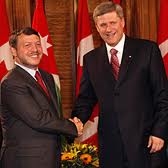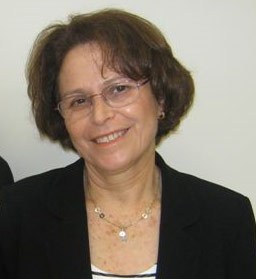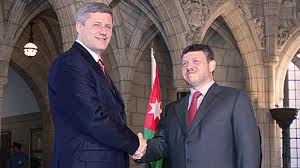 Arms control expert Gerald Steinberg has taken issue with the presence of Canada on a recent short list to help Jordan construct a nuclear reactor to generate energy for civilian purposes.
Arms control expert Gerald Steinberg has taken issue with the presence of Canada on a recent short list to help Jordan construct a nuclear reactor to generate energy for civilian purposes.
Canada is one of three suppliers that have been shortlisted by Jordan to construct a 1,000-megawatt (MW) Generation III reactor, which Jordan is to select by the end of 2011, according to a report in the Jordanian Times.
The report says that the three suppliers shortlisted by Jordan for sale of a nuclear reactor Canadian AECL, Russian Atomstroy export and a joint venture of French firm AREVA and Japanese Mitsubishi Heavy Industries.
“It would be ‘foolish’ for Canada or any other country to agree to sell to The Hashemite Kingdom of Jordan its first nuclear reactor, said Steinberg who is a professor of political science at Bar Ilan University.

King Abdullah/Steven Harper
His opinions have not been impacted by Israel’s support for the move.
Daniel Zonshine, spokesperson for the Israeli Foreign Ministry told The Winnipeg Jewish Review already in the spring that Israel had no objections to Jordan pursuing its quest for a nuclear energy program for civilian purposes, provided it meets the relevant international standards and treaties for non-proliferation.
“We are not against this, nor have we ever been” he said.
 Similarly, Miriam Ziv, Israel’s Ambassador to Canada and Amir Gissin, Israel’s Consul General based in Toronto, both told the Winnipeg Jewish Review in June 2011 that Israel had no objection to Jordan pursuing the development of nuclear power for civilian purposes. Ziv said that Israel would be “pleased” for the Jordanians if this occurred.
Similarly, Miriam Ziv, Israel’s Ambassador to Canada and Amir Gissin, Israel’s Consul General based in Toronto, both told the Winnipeg Jewish Review in June 2011 that Israel had no objection to Jordan pursuing the development of nuclear power for civilian purposes. Ziv said that Israel would be “pleased” for the Jordanians if this occurred.
Steinberg said that he doesn’t believe that Israeli officials can speak publicly of their opposition to the project.
“Israel has very delicate relations with Jordan and it¹s important that Israeli government officials avoid conflict with the Jordanian government. Israel realizes that there is very little chance of it [Jordan buying a nuclear reactor] so there is no real cost of going along with the notion [that it doesn¹t oppose Jordan¹s acquisition of a nuclear reactor].²
The reactor could be dependent in part on funds from Saudi Arabia, but Steinberg does not believe that Saudi Arabia would provide Jordan with money to purchase a nuclear reactor.
Still as of July 2011, Saudi Arabia granted Jordan $1.4 billion to support its budget (almost covering Jordan¹s projected budget 2011 deficit of $1.5 billion]. As he told the Winnipeg Jewish Review, “I don’t think Saudi Arabia would want to have a hostile neighbour on their borders [which could be the case if Jordan¹s King Abdullah is overthrown by the countries Palestinian majority in the future] anymore than Israel does.”
According to reports in the Jordanian Times, the disruption of natural gas supply from Al Arish in Egypt to Aquaba because of sabotage recently has highlighted Jordan’s vulnerability regarding energy needs.
Jordan produces 80 per cent of its electricity needs using gas from Egypt, and the disruptions have imposed a heavy cost on Jordan, which has to shift to the more expensive diesel and heavy oil fuel to generate electricity.

Steven Harper / King of Jordan
Jordan has no oil, but it is said to be home to at least two per cent of the world¹s uranium reserves, estimated at some 140,000 tonnes, which could be harnessed for nuclear power.
According to the Jordanian Times, Jordan’s drive for its first nuclear power plant comes as “part of a long-term vision of four nuclear reactors within the next quarter-century providing Jordan with 60 per cent of its electricity needs.”
Steinberg said that given the Jordanian kingdom’s “internal instability” especially in light of the Arab Spring, its “poor economic standing”, and “nuclear proliferation dangers”, it would be a real mistake for Canada or any other country to sell Jordan a nuclear reactor. He said this is ” aside from environmental dangers” a nuclear reactor would pose, given that Jordan is on an earthquake fault line and has scare water resources needed to cool a nuclear reactor.
Historically, Canada has not had a good history with regard to nuclear projects, Steinberg said.
“Canada sold India a reactor in the 1960’s, it was a different Canadian government, different Ministers but it is clear threat India used it to make nuclear weapons. The Canadian reactor was part of India’s nuclear infrastructure that was focused on making a nuclear bomb. The first one was detonated in 1974,” says Steniberg, who is also the CEO of NGO Monitor, based in Jerusalem.
In response to inquiries from the Winnipeg Jewish Review Post this past spring, Alain Courchaine, a media spokesperson for Canada¹s Department of Foreign Affairs and International Trade said that:
“Canada and Jordan concluded a bilateral Nuclear Cooperation Agreement (NCA) NCA during 2009² and these NCA`s are considered to be legally binding ‘international treaty level’ Agreements. The purpose of these NCA’s is to establish legally binding bilateral assurances that any nuclear material, material and technology received from Canada will only be used for peaceful, civilian and non-explosive purposes.”
Courchaine added, “A decision whether or not to enter into a NCA with prospective partner countries is the sole prerogative of the Government of Canada. Decisions in this regard are based on Canada¹s national and international legal obligations in terms of its domestic Non-Proliferation Policy as well as its membership of the international Nuclear Non-Proliferation Regime.”
Regarding a CANDO reactor, Courchaine wrote in an email “No CANDU reactor has ever been misused for nuclear weapons purposes.” Courchaine said.
Notwithstanding numerous recent reports in the Jordanian media regarding Jordan’s quest for nuclear power, Jordan’s nuclear quest is “pure theatre” according to Steinberg.”
“The image of being a player in the nuclear game has always been theatre or a source of popularity for image purposes. With Iran defying the entire nuclear proliferation framework, this triggered a chain reaction throughout the Middle East and the Jordanian regime felt they needed to be part of it. But in my view, it was never serious. Even two years ago, which was a period of greater stability and economic growth Jordan didn’t come close to having the [economic] resources for a nuclear reactor. Frankly, I’m surprised that Canadian officials took this facade seriously. Canada, like other potential suppliers mistakenly has confused the image building with the substance. This is about prestige.
“Jordan is not unique in this case. The nuclear business has basically ground to a halt. There are very few customers and so anytime a government starts to make noise about acquiring a nuclear reactor, various suppliers get excited. In almost all these cases the salespeople [be they Canadian, Russian, European, Japanese or American] have no knowledge of Middle East realities and their ministers in charge of selling nuclear technology are also out of the political and economic loop.²









